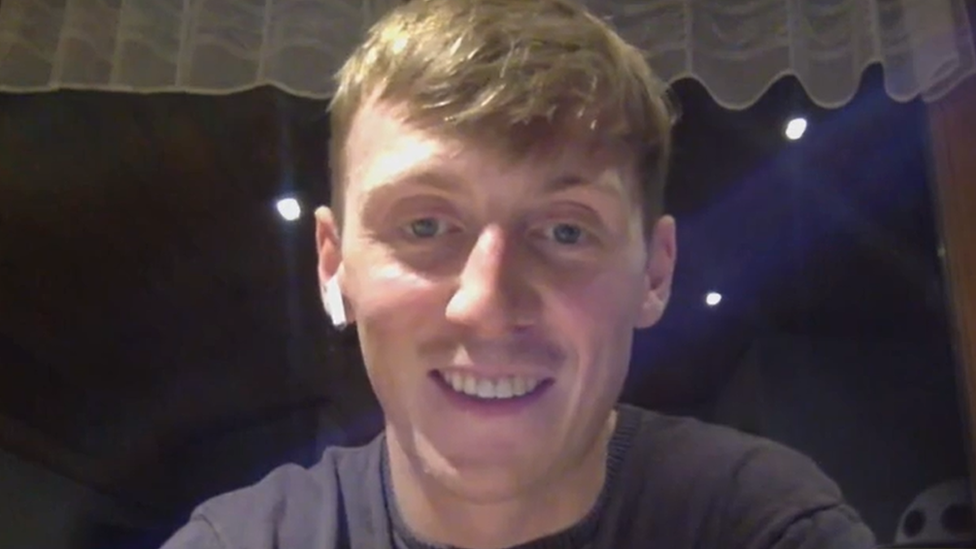British skier Tyler Harding says 'the fear is still there' when executing freestyle tricks
- Published

Harding has battled back from anterior cruciate ligament and ankle injuries to compete for Great Britain
Tyler Harding admits he still finds executing freestyle tricks "scary", but he has also learned to cope with fear.
The progression of trick complexity in skiing and snowboarding in big air and slopestyle has been remarkable.
Tricks up to 2160 degrees - six full spins - have been seen in big air competitions as the boundaries of what is possible are pushed to the limit.
"It's the difference between rational and irrational fear," British skier Harding told BBC Sport.
Tricks are broken down into segments and training starts on a trampoline before progressing on to an air bag and then the full jump on snow.
"A lot of times, it's a rational fear. I know I can do this. I've been doing this for 12 years now. The fear is still there but you can regulate it quite easily," he said.
The 27-year-old seriously contemplated retiring after an untimely bout of Covid-19 scuppered his chances of competing for Team GB at the Beijing 2022 Winter Olympics.
"There was definitely times when I was thinking 'I'm not sure what I'm doing any more, not sure why I'm doing it'", he adds.
But after battling back from ankle reconstruction surgery to be in a position to qualify for the Beijing Games, Harding did not want his efforts to have been wasted.
He put the huge disappointment of missing out on the Olympics into competing on the World Cup stage and last season became his most successful.
"I made more finals than I had before and had a top 10 at the hardest competition of the season in Silvaplana in Switzerland," he adds. "Sometimes you've just got to play your cards the best you can."
Harding has had his fair share of heartbreak at major events.
Injuries are an unfortunate inevitability in the sport. In the Sochi Olympic cycle he snapped his anterior cruciate ligament (ACL) and failed to return to full fitness in time to qualify.
He did make it to Pyeongchang in 2018 `but injured himself at the Games and spent 10 months recovering.
Harding was within the qualifying standard for Beijing when he broke his ankle four months out from the Winter Olympics.
It would normally have been a six-month recovery period but he was back within two months after "squeezing every bit of physio, strength and conditioning and rehab just to try and make it back to the Olympics".
He had two competitions left before the Games and needed to be in the top 30 in the world to qualify.
Harding finished 23rd in Mammoth, California, and was about to fly to his last event when he tested positive for coronavirus and could not compete. It meant he finished outside the top 30 and failed to be selected for Team GB.
"I did think maybe this is my time [to retire]," he said. "I'm getting one of the oldest in the ski world now. It's basically 18 to 22-year-olds who are now dominating the sport."
But he is proud of himself for continuing and is eyeing the 2026 Winter Olympics in Italy.
Harding took time out in the summer to mentally refresh and his season starts this weekend with a World Cup slopestyle in Stubai, Austria.
"Everything is working towards the next couple of years. I'm working hard for something which is going to work out for me and I'm positive about it," he said.
Great Britain have won an Olympic medal in either freestyle skiing or snowboarding at the last three Winter Olympics.
And with Mia Brookes, who at 16 became the youngest snowboard world champion in history in 2023, and Kirsty Muir, who has two ski slopestyle World Cup podiums under her belt at the age of 19, the future looks bright.
"GB are doing an insane job," Harding said.
"Kirsty and Mia have elevated to new world heights over the last couple of years.
"But the whole team is good and it's going to be our strongest line-up going into Milan-Cortina in 2026."